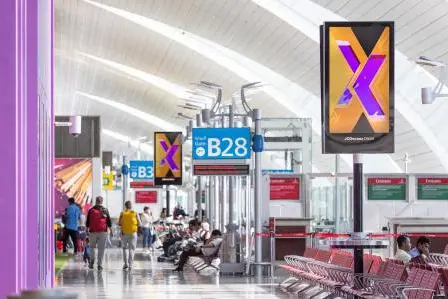PHOTO
Sharjah, UAE: Bee’ah, the award-winning UAE-based sustainability and environmental services pioneer, has been appointed the waste management partner for both of Dubai Airports’ airports, Dubai International (DXB), the world’s busiest airport, and Dubai World Central (DWC).
In addition to managing both airside and landside waste management operations, including non-hazardous waste, hazardous waste, used cooking and used engine oil waste and all recyclables, Bee’ah will work in conjunction with Dubai Airports’ facilities care team to handle and dispose of all waste from excess baggage and confiscated materials.
On the new achievement, Bee’ah Group CEO HE Khaled Al Huraimel, said: “Bee’ah has repeatedly proven to be among the Middle East’s leading environmental services provider, through the focus on creating a sustainable quality of life in the region. We are immensely proud to be the new waste management partner of one of the world’s busiest transportation hubs, Dubai Airports, and to support them with their sustainability mandate of reducing waste to landfills and implementing advanced recycling and material recovery solutions to promote a circular economy.”
Over 88 million passengers pass through Dubai’s two international airports annually, generating an estimated 5,500 tonnes of single-use plastic waste at the airports annually. To counter this, Dubai Airports has banned all single-use plastics including plastic cutlery, drinking straws and food packaging across its terminals from January 1 2020, in cooperation with its concessionaires and service partners.
Welcoming the collaboration with Bee’ah as perfectly timed close on the heels of the ban on single-use plastics coming into force at DXB and DWC, Jose Oller, Executive Vice President of Service & Operations at Dubai Airports said, “Most of the single-use plastics at our airports, including cutlery, drinking straws, and take-away food packaging have been replaced with sustainable alternatives as an immediate result of our initiative. While we work to reduce and ultimately achieve total elimination of single-use plastics across our airports, we need innovative waste management and recycling solutions to achieve our sustainability goals.”
Driving the UAE’s green agenda, Bee’ah has achieved a 76 percent waste diversion rate for the Emirate of Sharjah – the highest in the Middle East – and this is projected to reach 100 percent in 2021 upon completion of the Middle East’s first waste-to-energy plant in Sharjah. Bee’ah’s Waste Management division caters to millions of residents through municipal services, and multiple commercial establishments which include the world’s tallest building, Burj Khalifa, Dubai World Trade Centre and TECOM Group’s 11 business parks.
Bee’ah’s state-of-the-art Waste Management Complex processes three million tonnes of waste annually, by recycling, recovering and regenerating materials for reuse. Within the Waste Management Complex, Bee’ah hosts a number of facilities capable of recycling mixed fibres, plastics, metal, rubber, industrial and construction waste.
– Ends–
About Bee’ah:
An innovation leader and a pioneering force for sustainable solutions in the Middle East, Bee’ah is a public-private partnership company that was founded in 2007. With ventures in industries ranging from Waste Management, to Environmental Consulting, Renewable Energy, Technology, Sustainable Transportation, and Training & Development, Bee’ah is creating a better quality of life for all cities and communities in the region. Bee’ah has executed a comprehensive strategy focused on sustainability and digitalisation, which has reaped rich benefits in the form of the region’s highest waste diversion rates, and the GCC’s first waste-to-energy plant. Bee’ah has supported the region’s agenda for a circular economy and personifies the UAE’s ambitions in leading the dialogue surrounding sustainability in the MENA region. For more information, please visit: http://www.beeah.ae and connect at facebook.com/beeahuae and twitter.com/BeeahUAE
- Dubai Airports manages the operation and development of both of Dubai’s airports – Dubai International (DXB) and Dubai World Central (DWC).
- As integrator, Dubai Airports works to balance the interests of all stakeholders to maintain aviation growth, protect operational resilience and ensure that service providers collaborate to provide a safe and secure service and improve the experience of our customers whilst maintaining a sustainable business.
- DXB retained its position as the world’s number one airport for international traffic for the sixth consecutive year with 86.4 million passengers in 2019. DXB and DWC collectively welcomed 88 million passengers in 2019.
- Some 78 passenger carriers connect DXB to 245 airports in 238 cities across 103 countries.
Disclaimer: The contents of this press release was provided from an external third party provider. This website is not responsible for, and does not control, such external content. This content is provided on an “as is” and “as available” basis and has not been edited in any way. Neither this website nor our affiliates guarantee the accuracy of or endorse the views or opinions expressed in this press release.
The press release is provided for informational purposes only. The content does not provide tax, legal or investment advice or opinion regarding the suitability, value or profitability of any particular security, portfolio or investment strategy. Neither this website nor our affiliates shall be liable for any errors or inaccuracies in the content, or for any actions taken by you in reliance thereon. You expressly agree that your use of the information within this article is at your sole risk.
To the fullest extent permitted by applicable law, this website, its parent company, its subsidiaries, its affiliates and the respective shareholders, directors, officers, employees, agents, advertisers, content providers and licensors will not be liable (jointly or severally) to you for any direct, indirect, consequential, special, incidental, punitive or exemplary damages, including without limitation, lost profits, lost savings and lost revenues, whether in negligence, tort, contract or any other theory of liability, even if the parties have been advised of the possibility or could have foreseen any such damages.




















